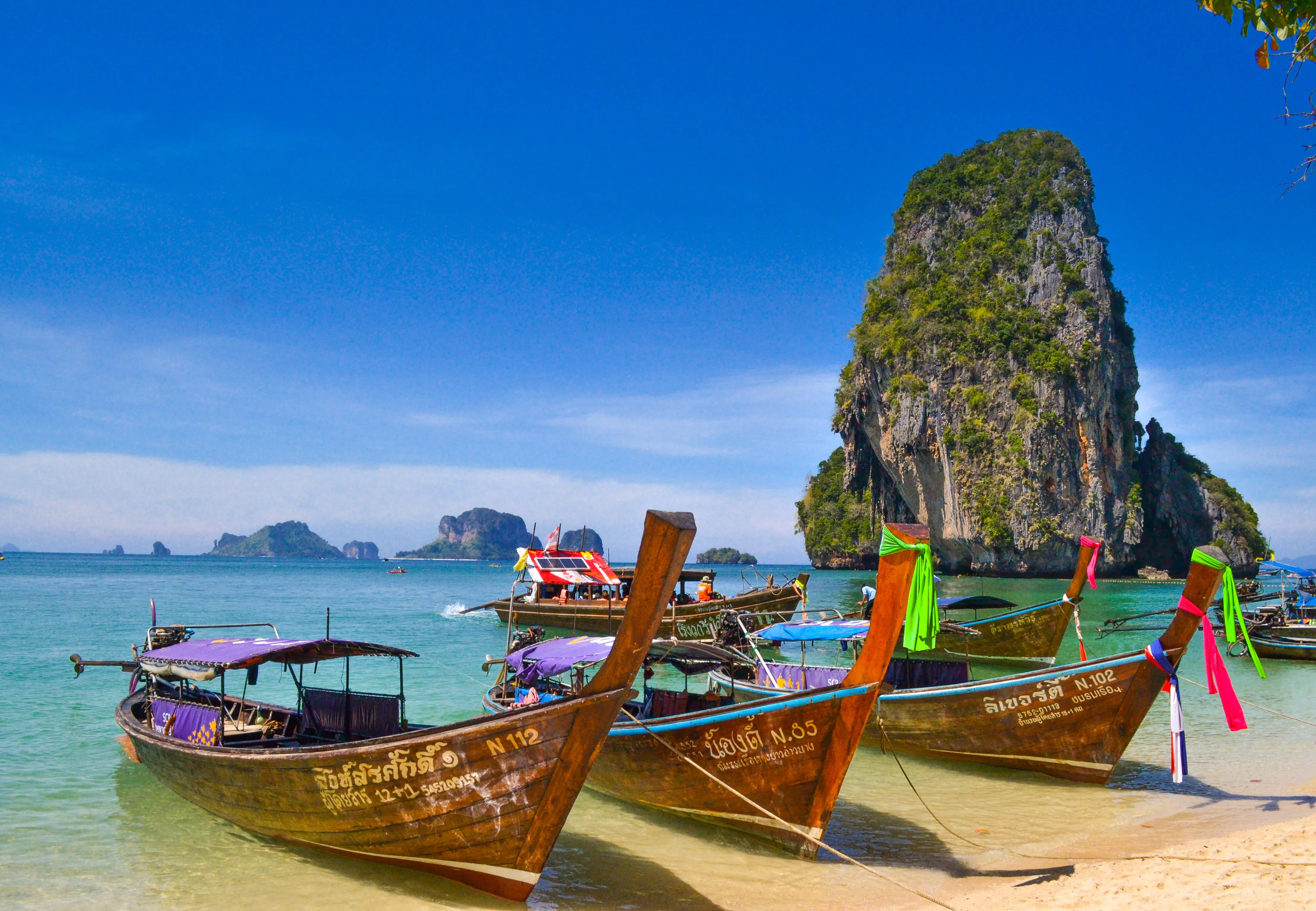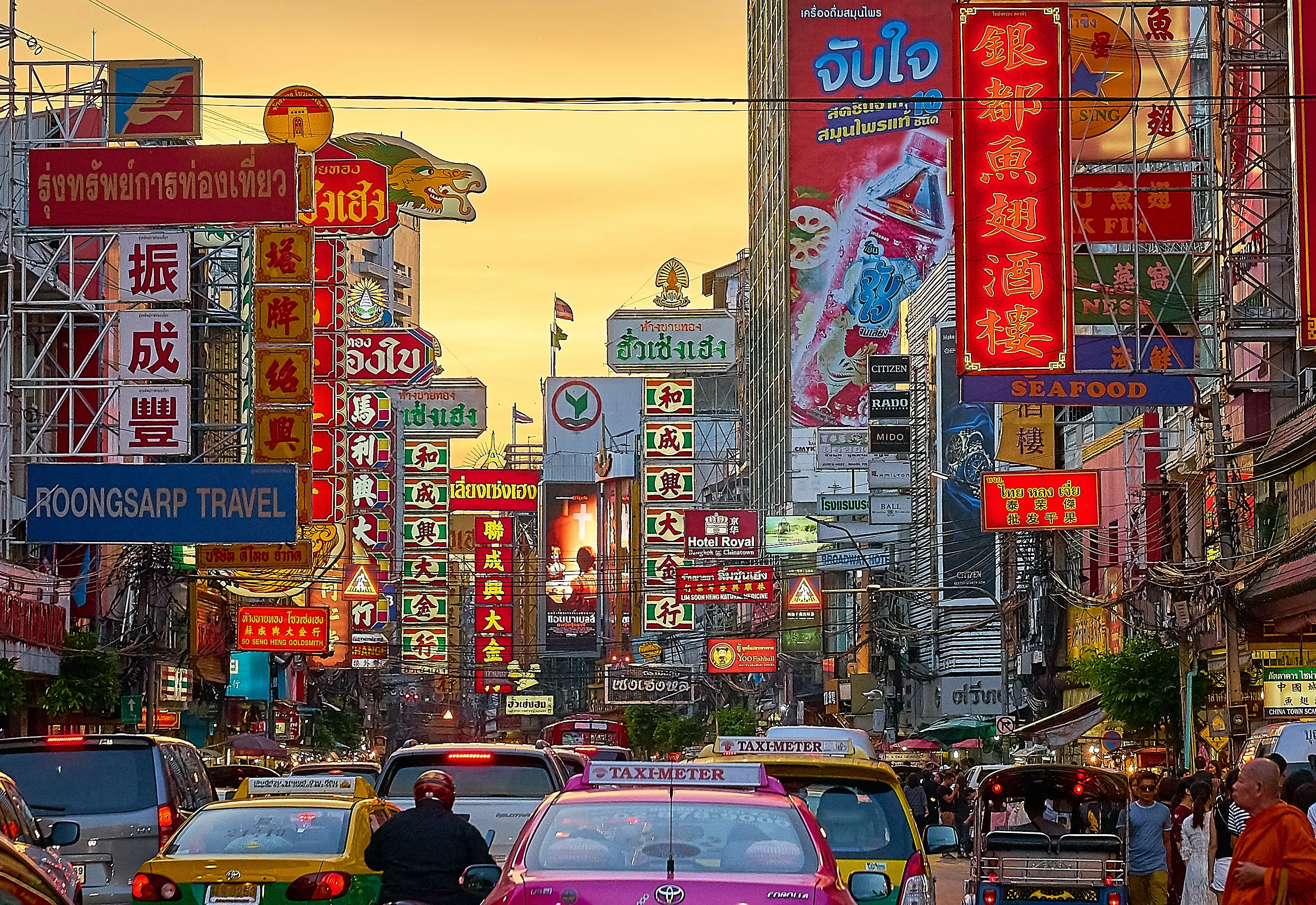One Country, Four Perspectives - Thailand

Table Of Contents
Thailand has long been a popular destination for tourists looking for beautiful beaches and adventures. Especially LGBTQIA+ travelers enjoy the country for its overall open-mindedness. However, there are some unique safety concerns in Thailand, especially when it comes to freedom of speech, certain types of crime and even bringing e-cigarettes into the country. In this guide, we will take a closer look at the advice given to travelers by four different governments, namely the UK, the US, Austria and Germany with regards to traveling in Thailand.
Up to date
Of the four countries, Austria is the only one that has a special segment with latest updates. They mention Demonstrations that have been going on since the Middle of July 2020, advising travelers to steer clear.
Advice against traveling to certain regions
All four countries agree on the areas one should avoid: Pattani, Yala and Narathiwat, and Songkhla, due to violence directed at the Thai government by a domestic insurgency.
However, the UK and Germany merely list the Southern part of Songkhla, while the US gives even further details of areas within Songkhla, naming the districts of Chana, Thepha, Nathawat, and Saba Yoi. The US further points out that martial law is in force in this region. This means the military has taken control over civilian authorities. It allows the military to enforce law and order, suspend civil rights, and make decisions typically reserved for civilian governments. They also warn travelers that the US embassy has limited ability to provide emergency services to US citizens in these areas, as traveling there requires special authorization for US government employees.
Terrorism
All four countries highlight the existence of a terrorist threat in Thailand, urging travelers to remain vigilant and cautious.
They mention specific incidents of terrorist attacks that have occurred in Thailand in the past, indicating the history of terrorist activities in the country. They list specific incidents and the years in which they occurred to demonstrate the on-going threat. Therefore, all countries advise caution and vigilance when traveling in Thailand.
The length and level of detail, however, differs between countries. The US lists a number of locations, where travelers should be especially careful, while Germany provides tips on how to act, i.e. to be alert, especially in crowded places and on special occasions and to always follow the instructions of security forces.
The US and the UK both also talk more broadly about terrorists targeting their countries’ citizens in general, not only in Thailand. Austria further mentions armed incidents between Cambodian and Thai troops at the Cambodian border near Preah Vihear and bombings in Bangkok and tourist centers such as Koh Samui and Hua Hin.
There is a clear consensus that terrorism is a potential threat in Thailand.
Political Situation
The UK and Germany both dedicate a segment to the political situation in Thailand. Both countries acknowledge the unpredictability and civil unrest in Thailand's political situation, and they both mention the recent general election. However, Germany provides more specific details about violence and unrest in certain regions and the restriction of freedom of expression.
Germany also offers travel advice, which the UK doesn’t. The advice includes being aware of the strict laws regarding criticizing the monarchy, staying informed through local and international media, avoiding demonstrations and large crowds, and following the instructions of local security forces.
Crime
All countries besides Austria provide a rather in-depth segment on crime, covering many different areas.
All four countries mention the importance of protecting personal belongings, such as passports, and being vigilant against pickpockets, theft, and scams.
They agree that while violent crimes involving tourists are relatively rare, they can still occur, including gun violence in specific instances. There is also a mention of sexually motivated violence, especially during parties or in isolated areas.
The UK, Germany and Austria mention full moon parties as hotspots for sexual assault. Germany points out that there were even deaths as a result of these assaults.
All countries also warn about various scams, including credit card fraud, job offers, bar tab scams, gem scams, and internet romance and financial scams. However, the US offers more detail than the other countries. The overall advice from each country is to always be cautious and vigilant to avoid falling victim to these scams.
Some countries provide unique information on certain locations within Thailand and the specific risks associated with them. The Austrian text mentions dangers in Phuket, Pattaya, and risks related to drug scenes on specific islands. The German text warns about the danger of theft, robbery, and violence in popular tourist destinations like Phuket, Koh Samui, Koh Tao, and Pattaya. The UK mentions Bangkok as a site of incidents. The US, however, does not mention any specific cities or islands.
In terms of transportation, all of the four countries warn travelers to be careful when using taxis, tuk-tuks, and other forms of transportation including jet skis, as there have been incidents of excessive fares, refusing passengers, and rental scams related to motorbikes, jet skis, and cars.
The UK has a short paragraph dedicated to detention facilities, talking about the harsh conditions in Thai prisons and detention facilities, with limited access to healthcare and reported cases of detainee deaths. None of the other countries comment on this particular topic.
Only the German and UK texts mention the specific regulations regarding e-cigarettes, highlighting their illegality and the associated penalties for using or possessing them.

Downtown Bangkok
Police Practices
All countries except Austria mention certain types of police practices that are different from what is considered standard in their country.
The UK warns that local authorities, including the police, may pass details of a crime, including photos, to the media without your consent.
The US points out that the investigating officials have publicly discredited people who have reported being a victim of crime. Therefore, the US advises contacting the Embassy and engaging a local attorney if you are a victim of an assault.
Germany points out that in many touristic areas, gangs tend to cooperate with corrupt police officers to falsely accuse tourists of crimes, such as having returned rented items such as jet skis or motor scooters damaged or of having committed petty crimes, such as the theft of fake watches. This is a tactic in order to extort money. Germany explicitly mentions the police station at Patong Beach as a particular hotspot for such activity.
The Thai Monarchy
The UK and Germany devote an entire paragraph to the laws regarding the Thai monarchy, while neither Austria nor the US mention this important circumstance.
The UK and Germany emphasize the sensitive nature of discussing the monarchy in Thailand and the legal implications of expressing critical views. Both mention that criticism or insulting the monarchy is considered illegal and subject to severe penalties.
They explain the laws are interpreted broadly, allowing for potential charges against journalists, human rights defenders, and members of the public.
Germany offers a little more background, briefly explaining that Thailand is a constitutional monarchy with the king serving as both head of state and the highest guardian of religion. It emphasizes that criticism of the king, royal family, and monarchy is generally considered taboo, without discussing any specific legal repercussions or jail sentences for such criticism.
The UK description provides more detailed information on the legal consequences of criticizing the monarchy, mentioning potential jail sentences of up to 15 years per offense. It also specifies that actions like retweeting or sharing critical content on social media related to the monarchy can also be punishable.
Transport
All four countries express concerns about road safety and advise travelers to be cautious with transportation options like taxis and rental vehicles. They also touch upon the availability of public transportation in Thailand. However, each country provides unique insights and additional safety tips.
They all emphasize the high number of road traffic accidents in Thailand, particularly involving motorcycles. Thailand is generally recognized as having a dangerous road safety record. Each country stresses the importance of wearing helmets when riding motorcycles.
The issue of scams and potential fraud related to renting vehicles, such as motorcycles, jet skis, and cars, is also a topic that comes up in each country’s description. Travelers are advised to be cautious to avoid such situations.
All four countries point out that public transportation options, including domestic flights, railways, and buses, exist and can be used.
Finally, taxi services, particularly in Bangkok, are mentioned by all four countries, with various warnings about potential issues with taxi drivers overcharging or refusing passengers.
The UK description mainly focuses on road traffic accidents, license requirements, and risks related to hiring vehicles. It further mentions sea travel concerns and accidents, which often happen due overloading of boats and particularly during monsoon season. None of the other countries touches upon this issue.
The US description includes general safety tips for travelers in Thailand, focusing on personal safety and precautions when using taxis or tuk-tuks.
The German description provides a more extensive overview of the transportation infrastructure in Thailand, including information about the road system, taxis, and tuk-tuks. It also warns about the potential for impulsive reactions and violence after traffic accidents, which doesn’t come up in the other countries’ texts.
The Austrian description shares similarities with the German one, emphasizing the importance of helmets for motorcyclists and cautioning against driving vehicles. It highlights the frequency of traffic accidents and underinsurance for motorcycles.

Safety advice for Mexico
Safety advice for Bosnia & Herzegovina
Safety advice for South Africa (coming soon)
Buying Property
Both the UK and Germany have a segment dedicated to buying property. Both countries caution readers about the challenges and potential risks associated with buying property in Thailand. They both recommend seeking legal advice and being vigilant in property transactions. They advise readers to exercise caution and conduct thorough research before making financial commitments related to property purchase. Finally, both countries emphasize the importance of seeking legal advice or assistance when dealing with property transactions in Thailand.
The German text provides more detailed information, covering issues with time-sharing rights, the inability to sell or exchange residential rights, and the challenges in enforcing individual rights due to companies disappearing from the market. It also mentions involving the police in certain situations, even though they may not investigate fully, and highlights the specific jurisdiction of the Tourist Police for disputes between tourists and Thais, with English-speaking staff.
Neither Austria nor the USA mention this topic.
LGBTQIA+
Both the UK and Germany have a short segment on LGBTQIA+. The UK considers Thailand generally safe for LGBTQIA+ travelers, while the Germans even say that Thailand is known for its high degree of acceptance of the community, especially in larger cities.
However, both countries also point to the fact that same-sex marriages are not legally recognised. Germany further delves into the consequences of this, stating there is no legal equality in terms of taxes, adoption, right to name and others.
Summary
Tourists should avoid traveling to the regions of Pattani, Yala, Narathiwat, and Songkhla due to violence. It is further prudent to be aware that there is a potential terrorism threat and travelers should remain vigilant and cautious. In terms of crime, overall violent crimes are considered rare but theft, pickpocketing and taxi scams or scams with rental vehicles are a possibility to be aware of.
Overall, while Thailand does have some unique safety concerns, the safety advice given by the four countries still makes Thailand sound much less dangerous than other countries.
Do you want to check out safety advice for other countries?
Find our other reviews of safety advice by four governments here:
Would you like us to compare travel advice for another country? Send us an email at hello@vigilios.com! We look forward to hearing from you.
Sources
UK Government Advice https://www.gov.uk/foreign-travel-advice/thailand/safety-and-security
US Government Advice https://travel.state.gov/content/travel/en/international-travel/International-Travel-Country-Information-Pages/Thailand.html
Austrian Government Advice https://www.bmeia.gv.at/reise-services/reiseinformation/land/thailand/
German Government Advice https://www.auswaertiges-amt.de/de/ReiseUndSicherheit/thailandsicherheit/201558
Photos by Humphrey Muleba, Sumit Chinchane, Geoff Greenwood on Unsplash





